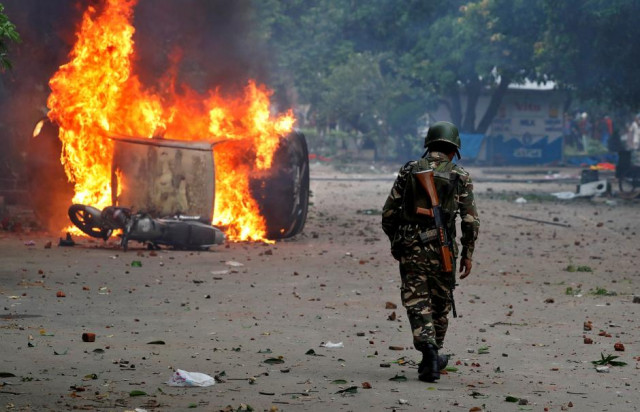$14.6tr was the impact of violence on global economy in 2016
Pakistan stands at 152 out of 163 countries in the Global Peace Index

Representational Image. PHOTO: REUTERS
Conflicts and resulting violence have a deep-rooted impact at all levels of the society. Although the human cost of being affected by violence is immeasurable, reports suggest that the economic impact of violence on the global economy was measured to be $14.6 trillion in purchasing power parity terms in 2016. This colossal amount is equivalent to 12.6% of the world’s GDP or $1,953 for every person.
Indo-Pak peace activist Raza Khan goes missing from Lahore
How did the world perform on the peace front in 2017?
Measuring peace
Produced by the Institute for Economics and Peace, the Global Peace Index (GPI) is the world’s leading measure of global peacefulness. The index ranks 163 independent states and territories using 23 qualitative and quantitative indicators, which fall in three broad domains; societal safety and security, ongoing domestic and international conflict and militarisation. Globally, GPI index for 2017 has shown a slight improvement of 0.3% in global peace with the level of peace improving in 93 countries, while deteriorating in 68 others. Syria remains the least peaceful country in the world preceded by Afghanistan, Iraq, South Sudan and Yemen.
State of peace: the Pakistani perspective
Out of a total 163 ranked countries, Pakistan stands at 152 in the GPI index. In terms of South Asian countries, Bhutan has been ranked as the most peaceful country whereas Pakistan appears at the bottom. This is particularly due to increasing number of deaths from external conflict due to persistent tensions between India and Pakistan on the unresolved dispute of Kashmir. Poor neighbourly relations have also led to increasing militarisation in the region.
Estimates show that the economic cost of violence in 2016 is $122,370 in purchasing power parity terms which is equivalent to 12.9% of GDP. In a hypothetical scenario where the country was enjoying a ‘high-peace environment,’ imagine the benefits that could be achieved had that amount of money been spent on an initiative that could improve overall societal welfare.
The report also mentions that Pakistan’s poor global rankings on the peace front cannot just be attributed to external conflicts but ongoing domestic strife too. A recent example is that of the Faizabad protest where a group had the capacity to stall the country. This leads one to think as to what comprises peace? How does a society become peaceful?
Pakistan, Iran urge ‘credible’ Afghan peace process
The Institute for Economics and Peace has found that the factors which contribute towards societies having ‘peaceful’ environments are well-functioning government, low levels of corruption, acceptance of the rights of others and good relations with neighbours.
Drawing from personal experience during my PhD studies, I can vouch that the acceptance and tolerance of difference ideas be it religious, political, cultural or social is a crucial point that sets societies apart. The fundamental tenet of ‘equality inclusion and diversity’ is not only celebrated but an effort is made to enshrine in day to day activities.
Just like a diversified economic base is one of the key drivers of its vibrancy and growth, societies only progress and achieve greatness if they harness the talents of their human capital base irrespective of their religious, cultural, linguistic or ethnic background. A well-functioning government, in which the rule of law is implemented across the board and where meritocracy is the only principle distinguishing one from another, is the need of the hour. As members of society, as parents and as teachers we must impart the fundamental lesson that in diversity is there beauty and in diversity is there strength.
The writer is a doctoral candidate at The Bartlett, UCL
Published in The Express Tribune, December 11th, 2017.
Like Business on Facebook, follow @TribuneBiz on Twitter to stay informed and join in the conversation.


















COMMENTS
Comments are moderated and generally will be posted if they are on-topic and not abusive.
For more information, please see our Comments FAQ